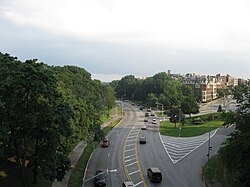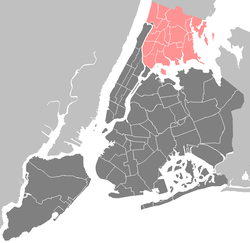Bedford Park, Bronx, New York
| Bedford Park | |
|---|---|
| Neighborhood of The Bronx | |

View of Mosholu Parkway in the Bronx
|
|
| Location of Bedford Park | |
| Coordinates: 40°52′12″N 73°53′08″W / 40.8700999°N 73.8856912°WCoordinates: 40°52′12″N 73°53′08″W / 40.8700999°N 73.8856912°W | |
| Country |
|
| State |
|
| City |
|
| Borough |
|
| Area | |
| • Total | 1.18 km2 (0.455 sq mi) |
| Population (2011) | |
| • Total | 37,344 |
| • Density | 32,000/km2 (82,000/sq mi) |
| Economics | |
| • Median income | $43,850 |
| ZIP codes | 10458, 10468 |
| Area code | 718, 347, 646 |
| Website | bedfordpark |
Bedford Park is a residential neighborhood in the northwest Bronx between the New York Botanical Garden and Lehman College. Its boundaries, starting from the north and moving clockwise are: Mosholu Parkway to the north, Webster Avenue to the east, East 198th Street to the south, and Goulden Avenue to the west. The Grand Concourse is the primary thoroughfare through Bedford Park. The IND Concourse and IRT Jerome Avenue Lines of the New York City Subway serve the area. Zip codes include 10458 and 10468. The neighborhood is part of Bronx Community District 7. The area is patrolled by the 52nd Precinct located at 3016 Webster Ave in the Norwood section of the Bronx.
The area now known as Bedford Park was mostly farmland outside the town of Kingsbridge, then an unincorporated suburb of New York City. The area began to be developed with the construction of the Jerome Park Racetrack, for thoroughbred horse racing, by Leonard Jerome and August Belmont, Sr. in 1866. Jerome Park Racecourse became the first home of the famous Belmont Stakes horse race, until 1890. To attract the wealthy to the racecourse, Leonard Jerome built what is today Jerome Avenue. In 1874 the town of Kingsbridge was officially incorporated into New York City.
In 1890, Jerome Park Racecourse was sold. Construction was started to convert it into the Jerome Park Reservoir, to store fresh water from the New Croton Aqueduct. At the same time, the neighborhood of Bedford Park was beginning to take shape. Forty "villas" (suburban houses) were built on a 23-acre (93,000 m2) stretch, in a planned community, named Villa Avenue.
...
Wikipedia




